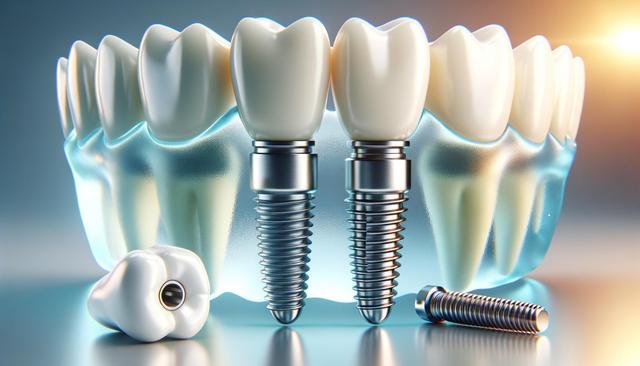What Are Dental Implants?
Dental implants are artificial tooth roots, typically made from titanium, that are surgically placed into the jawbone to support replacement teeth such as crowns, bridges, or dentures. They are designed to function and look like natural teeth, offering a permanent and stable solution for tooth loss. Over time, the implant fuses with the jawbone in a process called osseointegration, which ensures durability and a secure fit.
This option is often considered for individuals who have lost one or more teeth due to injury, decay, or periodontal disease. Unlike removable dentures, implants are fixed in place, providing a more natural feel and aesthetic. The structure of an implant includes:
- The implant post (surgically inserted into the jawbone)
- The abutment (connector between post and crown)
- The crown (visible part that mimics a natural tooth)
Dental implants can be used for single tooth replacements, multiple teeth, or even full arch restorations, making them a versatile solution in modern dentistry.
Benefits of Dental Implants
There are several advantages to choosing dental implants over other tooth replacement options. Their ability to integrate with bone tissue offers a number of functional and aesthetic benefits, such as:
- Improved appearance – implants look and feel like your own teeth
- Enhanced comfort – no slipping or discomfort as with dentures
- Better oral health – adjacent teeth are not altered as they are with bridges
- Durability – with proper care, implants can last many years or even a lifetime
- Improved speech and eating ability – no worry of movement while talking or chewing
Because they help maintain bone structure, implants also prevent the facial sagging that can occur with prolonged tooth loss. This contributes to a more youthful and confident appearance over time.
Who Is a Candidate for Dental Implants?
While dental implants are a reliable option for many people, not everyone may be an immediate candidate without some form of preparatory treatment. To determine eligibility, a thorough dental and medical evaluation is necessary. Ideal candidates typically have:
- Good oral hygiene practices
- Healthy gums and sufficient bone density
- No uncontrolled chronic diseases (e.g., diabetes, heart conditions)
- Non-smoking habits, as smoking can impede healing
In cases where bone loss has already occurred, bone grafting or sinus lifting procedures may be required to provide a solid foundation for the implant. A dental professional can advise on the best course of action based on individual needs and conditions.
The Dental Implant Procedure
The process for getting dental implants involves multiple steps and can take several months to complete, ensuring proper healing and integration. Here is a general overview of what to expect:
- Initial consultation and diagnostic imaging
- Surgical placement of the implant post
- Healing period (3 to 6 months for osseointegration)
- Placement of the abutment
- Custom crown fabrication and fitting
Some cases may allow for same-day implants, but most require a staged approach to ensure the long-term success of the procedure. Local anesthesia or sedation is typically used during surgery to minimize discomfort.
Follow-up visits are essential throughout the process to monitor healing and ensure the implant is integrating correctly. Patients are also advised to maintain excellent oral hygiene and attend regular dental check-ups to prolong the lifespan of their implants.
Cost and Maintenance Considerations
Dental implants are considered a long-term investment in oral health. While the initial costs can be higher compared to other restorative options, their longevity and benefits often make them more cost-effective over time. Factors that affect pricing include:
- Number of implants needed
- Need for additional procedures (e.g., bone grafting)
- Materials used and complexity of the case
- Geographic location and provider expertise
Insurance coverage for implants varies, so it’s worth discussing financial options with your dental office. Some clinics offer payment plans or financing to make the treatment more accessible.
In terms of maintenance, dental implants require the same care as natural teeth—brushing twice daily, flossing, and routine professional cleanings. Avoiding habits like smoking and teeth grinding can further protect the integrity of the implants. With consistent care, implants can remain functional and aesthetically pleasing for decades.




Leave a Reply